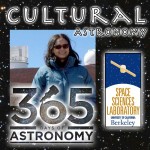Podcaster: Nancy Alima Ali
 Title: Cultural Astronomy – Native Skywatchers, A Conversation with Annette Lee
Title: Cultural Astronomy – Native Skywatchers, A Conversation with Annette Lee
Organization: Multiverse, Space Sciences Lab, University of California at Berkeley
Links: http://multiverse.ssl.berkeley.edu/, http://www.astroalima.com
http://web.stcloudstate.edu/planetarium/native_skywatchers.html
Description: In this conversation with Annette Lee, Associate Professor of Astronomy and Physics at St. Cloud State University in Minnesota, we will explore how astronomical and cultural knowledge is embedded in sky stories. An artist-scientist of Native American ancestry, Lee’s interdisciplinary work has reconnected the Dakota and Ojibwe tribes with the star knowledge her forefathers have shared for millennia.
Bio: Nancy Alima Ali, M.Ed., is a Coordinator of Public Programs at Multiverse at the Space Sciences Lab at the University of California, Berkeley. For over 15 years, Ms. Ali has been active in both formal and informal education as a classroom teacher, college instructor, museum educator, curriculum developer and program manager. Ms. Ali has a particular interest in exploring the ways in which multiple worldviews contribute to our understanding of the cosmos. She blogs about the intersection of astronomy and culture at www.astroalima.com.
Today’s sponsor: This episode of “365 Days of Astronomy” is sponsored by — no one. We still need sponsors for many days in 2015, so please consider sponsoring a day or two. Just click on the “Donate” button on the lower left side of this webpage, or contact us at signup@365daysofastronomy.org.
Transcript:
Introductions – Nancy Alima Ali from UC Berkeley’s Space Science Lab and Annette Lee from St. Cloud State University
About Ojibwe and Dakota/Lakota people – meaning of names, context of place
Star knowledge and sacred sites
Star maps – description, inclusion of both Greek and Native constellations, Polaris in center of map, four sections representing seasons, how to use the maps
Ojibwe map available at http://web.stcloudstate.edu/aslee/OJIBWEMAP/home.html
D(L)akota map available at http://web.stcloudstate.edu/aslee/DAKOTAMAP/home.html
Ojibwe winter constellation story: Wintermaker or Biboonkeonini, connection to canoeing, connectedness of star knowledge to survival and foundation of life, not just entertainment
Misconceptions about “myth”
As above, so below
Kapemni – twisting, like two tipis connecting Earth and sky
Knowledge is open for all, universal idea, important to credit where knowledge comes from
We have 4 parts – self, family, community, seven generations (ancestors and descendents)
Part of something bigger and more connected
We come from the stars
Similarity with astrophysics
Blue spirit woman who lives in center of scoop in Big Dipper, acts as doorkeeper who helps spirits who are coming into the world
How knowledge is passed on from generation to generation
Knowledge being lost as older generation passing
Education efforts to keep knowledge alive for younger generations
Important protocols that go with cultural knowledge – stories that are only told when there is snow on the ground, implications of stories being written down and read at anytime of the year
A moment of crisis because losing information
Western thinking about knowledge and Native ways of acquiring knowledge
For more information, visit http://web.stcloudstate.edu/aslee/, http://web.stcloudstate.edu/planetarium/index.html
Available resources include teacher workshops, constellation guidebook (available on Amazon.com), free star map downloads, purchase poster of star maps, audio of constellation names and vocabulary
Thanks to Annette Lee for joining us today. This is Nancy Alima Ali, here to remind you that we all share the same universe. Thanks for listening!
End of podcast:
365 Days of Astronomy
=====================
The 365 Days of Astronomy Podcast is produced by NUCLIO. Audio post-production by Richard Drumm. Bandwidth donated by libsyn.com and wizzard media. You may reproduce and distribute this audio for non-commercial purposes. Please consider supporting the podcast with a few dollars (or Euros!). Visit us on the web at 365DaysOfAstronomy.org or email us at info@365DaysOfAstronomy.org. This year we celebrate cosmic light as light is our info messenger in the universe. Join us and share your story to celebrate the International Year of Light. Until tomorrow! Goodbye!


Trackbacks/Pingbacks